“Starting a new fitness routine can feel overwhelming,” says Rachel Vaziralli, CPT, director of fitness design at Orangetheory Fitness. “But remember that everyone starts somewhere, and the most important step is the first one.”
You don’t need much time to fit in an effective strength workout, nor do you need to train every day. Take things slow and increase your training as you feel comfortable.
“If you’re new to exercise, begin with two or three weekly sessions. This helps build consistency without overwhelming your schedule or body,” Vaziralli says. She points out that a good workout is about quality over quantity saying, “Ensure you perform exercises correctly to avoid injury and maximize effectiveness.”
Strength training is important because it helps to build and maintain lean muscle mass (which is even more important as we age), helps improve balance and mobility, increase bone density, and boost heart health. Ultimately, strength training helps us to complete everyday tasks with ease—and continue to do so into our later years.
“Starting a new fitness routine can feel overwhelming. But remember that everyone starts somewhere, and the most important step is the first one.” —Rachel Vaziralli, CPT
Remember to talk to your doctor before implementing a new fitness routine, and be sure to be tuned into your body.
“Paying attention to how your body responds during and after workouts is crucial. Feeling sore after a new activity can be expected, but pain is not. Adjust your exercise intensity and duration to ensure you are challenging yourself without risking injury,” Vaziralli says.
Grab a mat, a pair of dumbbells (or something you can use as weights), turn on a great playlist, and try this 20-minute full-body beginner strength workout. Complete four rounds two to three times a week to build your strength, and add challenges as you get stronger.
1. Knee push-up
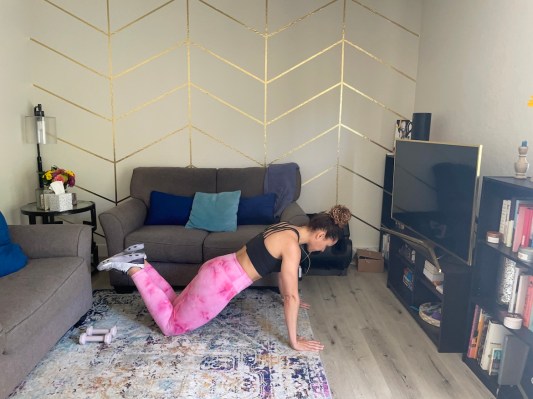
- Start in a plank position on your knees with your hands just outside your shoulders.
- Bend your elbows at a 45-degree angle to lower your chest to the floor (or as far as you can go).
- Push away from the floor and bring yourself back up to the starting position.
- Repeat for 10 reps.
When you’re ready to progress this move, lift your knees up off of the floor and perform the push-ups on your toes.
2. Squat
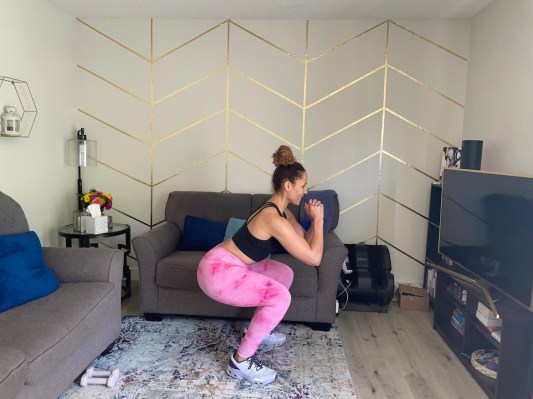
- Stand with your feet hip- to shoulder-width apart and your toes slightly turned out.
- Clasp your hands in front of your chest.
- Slowly bend your knees as you push your hips back to lower toward the floor.
- Lower down as far as comfortable, or until your thighs are parallel with the floor.
- Drive through your feet to return to a standing position.
- Repeat for 10 reps.
For an added challenge, hold a dumbbell in each hand.
3. Shoulder press
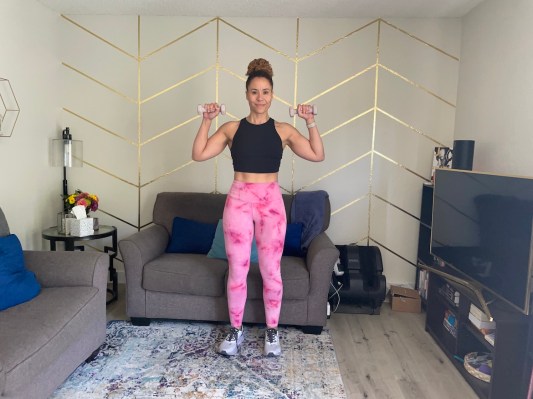
- Stand with your feet hip-width apart and hold a dumbbell in each hand, arms at your sides. Your palms should be facing in toward your body.
- Lift the weights to your shoulders.
- Rotate your elbows out to the side so your palms are facing forward. This is your starting position.
- Brace your core and engage lower body for stability. Exhale as you press both dumbbells directly over head.
- Keep pressing until your arms are straight.
- Inhale as you return the dumbbells back down to your shoulders.
- Repeat for 8 reps.
4. Glute bridge
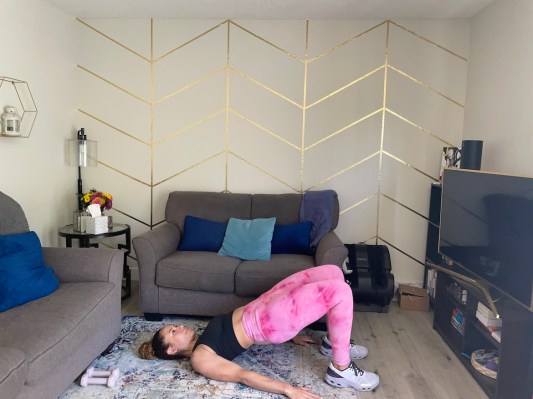
- Lie on your back with your knees bent and your feet flat on the floor, arms down by your sides.
- Squeeze your glutes and core, then drive through your heels to lift your hips off the floor until your hips and shoulders are in a diagonal line.
- Return your hips to the floor.
- Repeat for 12 reps.
To progress this exercise as you get stronger, you can hold a dumbbell on your hips.
5. Reverse lunge
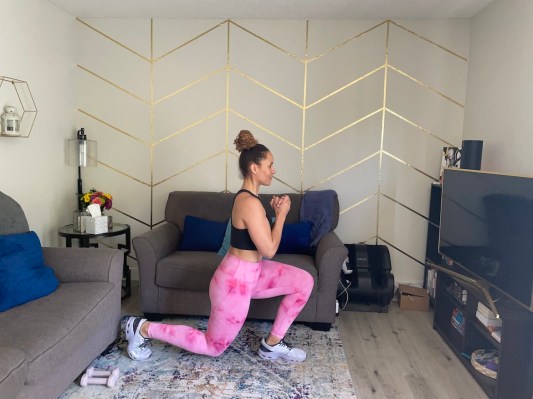
- Stand with your feet hip-width apart and your hands clasped in front of your chest.
- Step your right foot back and bend your knees until they are both at a 90-degree angle.
- Drive through your right foot to return to the starting position.
- Repeat for 6 reps.
- Repeat the movement on your opposite leg for 6 reps.
6. Chest press
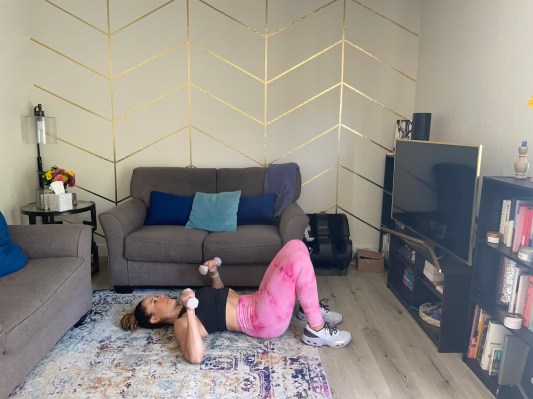
- Lie on your back with your knees bent and your feet flat on the floor.
- Hold a dumbbell in each hand with your arms at a 45-degree angle. The backs of your upper arms should rest on the floor.
- Push your arms up above your head until they are straight.
- Return to the starting position.
- Repeat for 10 reps.
7. Plank
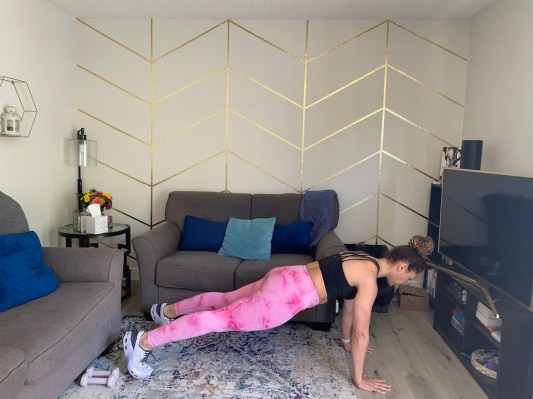
- Start on all fours in tabletop position with your hands directly under your shoulders and your knees directly under your hips.
- Step your feet back and put your weight into your toes, keeping your wrists under your shoulders.
- Bracing your glutes and core, keep your body in a straight line from your shoulder girdle to your feet.
- Hold for 45 seconds.
To make this move easier, you can drop down to your knees. As you get stronger, you can hold your plank for longer.
